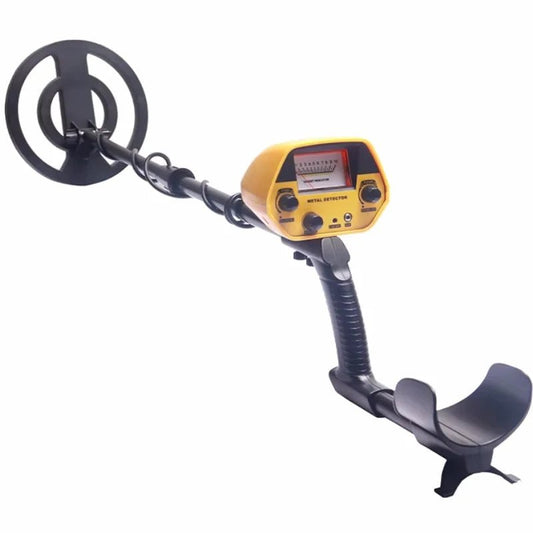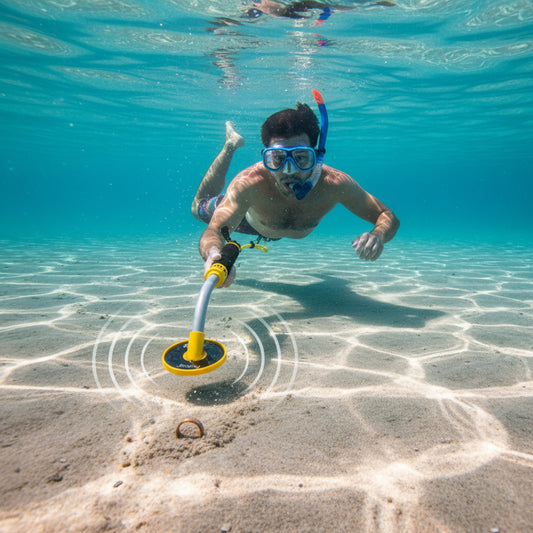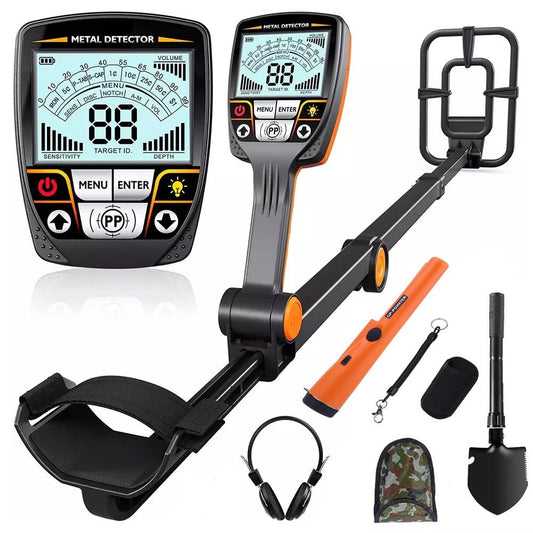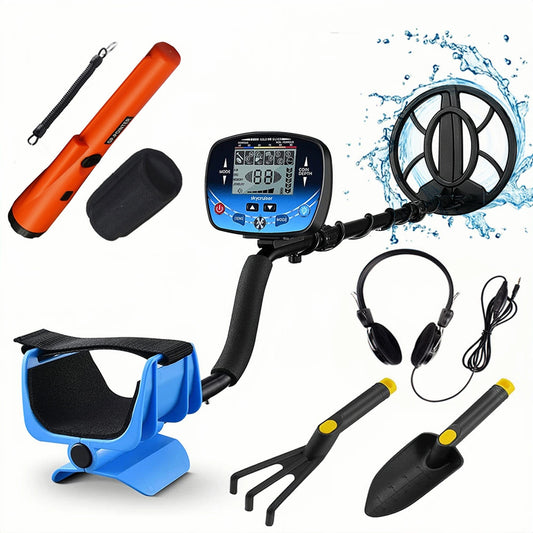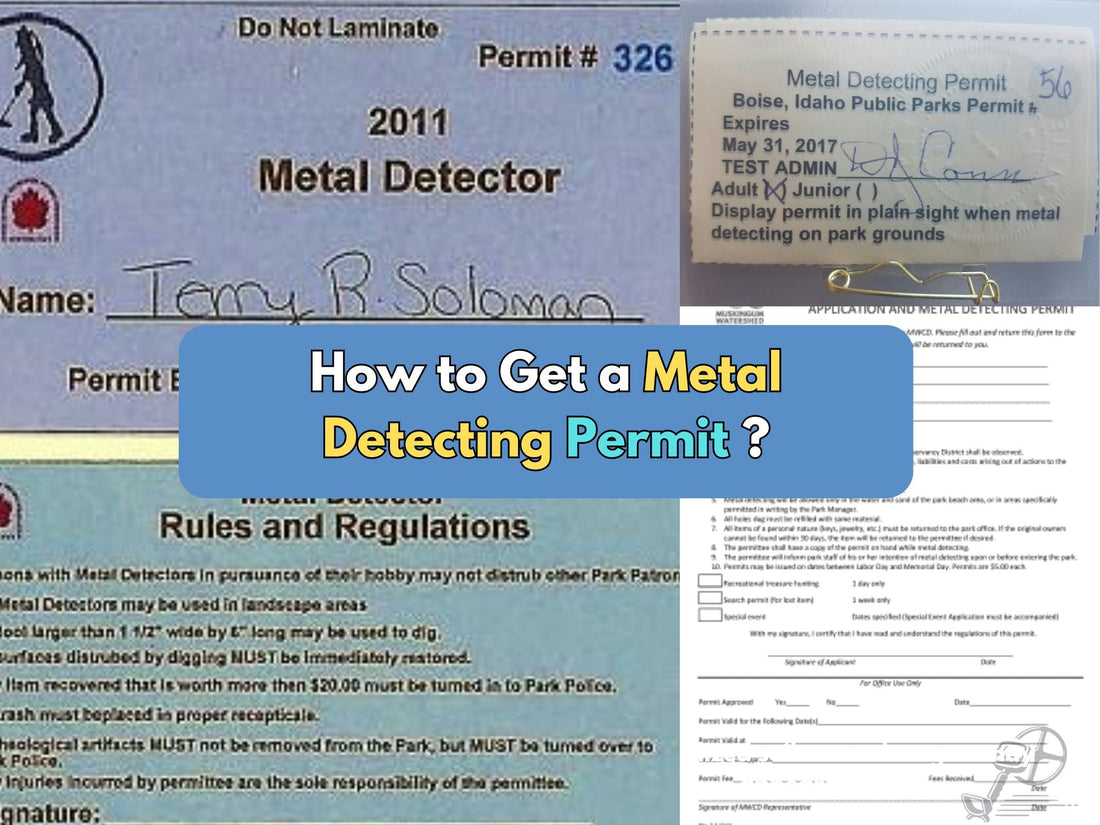
Metal Detecting Permits: How to Get a Permit for Your Metal Detector in Any County
Share
Obtaining a metal detecting permit is essential for legal use in public parks, county lands, or state sites. Each county and state may have unique regulations, so applying often means contacting the local parks department or land management office.
To begin, reach out to your parks and recreation department or city office. Most places require a form detailing where you’ll use the detector and any specific activities, especially in protected or archaeological areas.
Include your contact information to receive updates on your permit status. Processing times vary from days to weeks, but following each park’s rules ensures a responsible and enjoyable metal detecting experience.
.
Do I Need a Permit to Metal Detect ?
The need for a metal detecting permit depends on the location where you wish to detect. Public lands like state parks and county parks usually require a permit to metal detect due to the potential of encountering historically significant artifacts or protected resources. Each state or county may have specific guidelines, so it’s crucial to verify whether a permit is needed before you start.
Certain areas, especially historic or archaeological sites, may prohibit metal detecting altogether to preserve artifacts. However, some city parks or open public lands might allow metal detecting without a permit, but only for non-invasive activity that doesn’t disrupt the land. Always check the official regulations of the property you intend to explore, as failure to comply may lead to fines.
Discover our article about Metal Detecting Laws Around the World.

Popular Parks for Metal Detecting & Related Links to Get Permit.
For those who love exploring history and treasures, there are several popular parks where metal detecting is permitted with proper permits. These parks often have designated areas where the activity is allowed and specific rules for detectorists to follow. Parks that permit metal detecting typically have guidelines to protect natural resources and limit disruption to the environment.
Some of the best places for metal detecting in the U.S. include large, open parks and sports fields where digging won’t damage landscapes. Many parks also encourage visitors to leave the area as they found it by refilling holes and removing any debris or trash found during searches. This practice not only shows respect for the park but also helps maintain clean, accessible spaces for other visitors.
In addition to public parks, some private properties allow metal detecting with the landowner's permission.

Here’s a list of popular U.S. state parks where metal detecting is commonly allowed, along with general instructions for finding permit links:
| State Park | Instructions for Permit Link |
|---|---|
| Adirondack Park, New York | Visit New York State Parks website, search for "Adirondack Park metal detecting permit" |
| Algonac State Park, Michigan | Michigan DNR's official website provides permit details under "Metal Detecting" |
| Aloha State Park, Michigan | Michigan DNR website lists allowed areas and application forms |
| Bald Mountain Recreation Area, MI | Check Michigan DNR website for permit specifics |
| Bay City State Park, Michigan | See Michigan DNR metal detecting section for permit information |
| Big Bone Lick State Park, KY | Kentucky Parks website for Big Bone Lick’s permit requirements |
| Cape Henlopen State Park, Delaware | Delaware State Parks page lists regulations and application instructions |
| Colorado Bend State Park, Texas | Visit Texas Parks and Wildlife Department for permit details |
| Fort Stevens State Park, Oregon | Oregon State Parks site for permits in designated areas |
| Golden Gate Canyon State Park, CO | Colorado Parks and Wildlife lists application process online |
| Hunting Island State Park, SC | South Carolina State Parks site lists requirements for detecting permits |
| Huntington Beach State Park, SC | Visit South Carolina State Parks page for permit details |
| Lake Eufaula State Park, Oklahoma | Oklahoma Tourism and Recreation Department has permit forms |
| Little Missouri State Park, ND | North Dakota Parks page provides metal detecting rules |
| McLain State Park, Michigan | Michigan DNR website provides details on permit requirements |
| Myrtle Beach State Park, SC | South Carolina State Parks page for metal detecting permits |
| Natural Falls State Park, OK | Oklahoma Tourism website has rules on detecting |
| Osage Hills State Park, Oklahoma | Oklahoma Parks and Recreation Department for permit instructions |
| Pismo State Beach, California | California State Parks for details on beach metal detecting permits |
| Pocahontas State Park, Virginia | Virginia Department of Conservation and Recreation website for metal detecting permit info |
| Presque Isle State Park, PA | Pennsylvania State Parks lists permit information online |
| Rockport State Park, Utah | Visit Utah State Parks website for permit requirements |
| South Padre Island State Park, TX | Check Texas Parks and Wildlife Department for permit regulations |
| Stone Mountain State Park, NC | North Carolina Division of Parks and Recreation for permits |
| Warren Dunes State Park, MI | Michigan DNR lists areas open to metal detecting and permit details |
| Washington State Parks (various) | Washington State Parks website has a section for metal detecting permits across multiple parks |
U.S. State Parks Permit
Each state in the U.S. has its own set of regulations for metal detecting within state parks, with some states allowing it more freely than others.
To make the process easier, many states provide related links online where detectorists can access permits or find specific information on the rules for each state park. Here are some general guidelines to keep in mind when metal detecting in state parks across the U.S.:
- Permit Requirements: Most state parks require a metal detecting permit, especially in historically significant areas or parks with sensitive ecosystems. Permits are often applied for through each park’s website or local parks department.
- Restrictions by Area: Some states only allow metal detecting in specific areas, like beach zones or open fields, to minimize impact on protected sites.
- Online Resources: Checking the state’s parks department website for downloadable permit applications, contact information, and detailed rules can help you plan ahead. Some parks also provide interactive maps showing where metal detecting is allowed.
Following these guidelines helps ensure compliance with state regulations, allowing detectorists to enjoy their hobby responsibly.
Do I Need a Permit to Metal Detect on USA Beaches?
Beach areas in the U.S. have specific rules regarding metal detecting, with some beaches allowing it freely and others requiring permits.
Generally, popular beach destinations permit metal detecting as long as detectorists follow set guidelines, which may include restricted hours or designated zones to prevent conflicts with other beachgoers.
Beach detecting is typically allowed in open areas along the shoreline, but some locations may require a permit to dig below the surface. Additionally, specific state and county beaches may have varying rules, so it’s important to confirm with local authorities if a permit is necessary.
By respecting beach regulations, detectorists can make the most of these popular locations and ensure their hobby remains accessible.

Here's a list of popular U.S. beaches for metal detecting, along with their associated counties:
| Beach | County |
|---|---|
| Daytona Beach | Volusia County, FL |
| Myrtle Beach | Horry County, SC |
| Virginia Beach | Virginia Beach City, VA |
| South Padre Island Beach | Cameron County, TX |
| Ocean City Beach | Worcester County, MD |
| Jones Beach State Park | Nassau County, NY |
| Huntington Beach | Orange County, CA |
| Clearwater Beach | Pinellas County, FL |
| Malibu Beach | Los Angeles County, CA |
| Waikiki Beach | Honolulu County, HI |
| Galveston Beach | Galveston County, TX |
| Rehoboth Beach | Sussex County, DE |
| Panama City Beach | Bay County, FL |
| Siesta Key Beach | Sarasota County, FL |
| Assateague Island National Seashore | Worcester County, MD |
| Pensacola Beach | Escambia County, FL |
| Gulf Shores Public Beach | Baldwin County, AL |
| Pismo State Beach | San Luis Obispo County, CA |
| Long Beach | Nassau County, NY |
| Cape May Beach | Cape May County, NJ |
| Hilton Head Island Beach | Beaufort County, SC |
| Venice Beach | Los Angeles County, CA |
| Jekyll Island Beach | Glynn County, GA |
| Outer Banks Beaches | Dare County, NC |
| Tybee Island Beach | Chatham County, GA |

Discover our other articles about Best Places for Metal Detecting and our Tips Techniques for Coins, Beach Hunts, and More.

